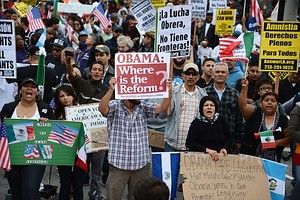Immigration reform, once the top priority coming out of the 2012 presidential election, has stalled. The Senate has passed legislation, but the House is badly divided.
The current system is a shambles. Legal categories and subcategories, quotas, and lotteries have created a flourishing legal industry. The immigration bureaucracy is a lower level of Dante’s Hell. Foreign students are turned away from U.S. universities, highly-skilled individuals are barred from working in America, and even political refugees sometimes are denied entry.
Finally, some 11 million people live in the U.S. illegally. They invest less in America, are vulnerable to abuse, and disrupt an already incomprehensible immigration policy.
Attempting to fence off the country is no answer to anything. It would be difficult for a generally free society with extensive borders to close out the rest of the world. Worse, to be effective such controls as ID cards, citizenship checks, workplace raids, employer sanctions, and more would undermine domestic liberties.
Anyway, immigration benefits the U.S. The economic advantages are significant. Many immigrants are natural entrepreneurs, establishing companies, creating jobs, and driving innovation. Well-educated and highly-trained foreign workers are inventive and productive. Expanded work forces increase business flexibility, allowing companies to quickly respond to changing demands. Larger labor forces also encourage specialization. Labor productivity rises as companies adjust to larger work forces and invest in employees.
Immigration may depress wages for the least skilled workers. However, these are the last jobs that government should seek to protect. Moreover, the work force, like the economy, is not a fixed pie. Immigration makes a more innovative, flexible, and productive economy, leading to new and better jobs. The benefits rise over time, with an expanding economic pie.
Immigration also offers a mix of cultural benefits and challenges, complicated but manageable. Unfortunately, perverse government policies exacerbate political and sovereignty problems. For instance, affirmative action benefits immigrants whose ancestors suffered no discrimination. Bilingual education and foreign language ballots relieve pressure on immigrants to learn English. Welfare benefits and services attract putative dependents rather than incipient entrepreneurs.
While elites tend to favor increased immigration, the public is more hostile to opening America’s borders. Indeed, immigration has become one of Washington’s most emotional political battles. Which makes it difficult to generate the political consensus necessary for change.
To move forward Congress should separate employment from citizenship. Since the most obvious benefits of immigration are economic, legislators should expand work visas for multiple skill levels. Renewable permits should be issued to individuals; compliance could be enforced by requiring immigrants to post a bond or deposit some of their earnings in a bank account, payable upon their departure. Immigration auctions or tariffs also would be innovative alternatives.
Congress also should regularize the status of those currently in America illegally. Washington should grant residence and employment permits, renewable or permanent, to the undocumented, freeing them of the fear of deportation. They then would be more likely to invest in education and training and integrate into the larger surrounding community.
In contrast, Congress should leave debate over turning illegal aliens into fellow citizens as well as legal workers for the future. In fact, some policymakers are considering just such a compromise.
For instance, Rep. Raul Labrador (R-ID) advocated “a legal process where people know they can be here for a long period of time, renew their visas, but you don’t need a pathway to citizenship.” The Republican National Committee urged creation of renewable work permits without the promise of citizenship. Rep. Bob Goodlatte (R-VA), Chairman of the House Judiciary Committee, asked: “Are there options that we should consider between the extremes of mass deportation and a pathway to citizenship?”
Some immigration critics complain that this approach would reward illegal behavior. The undocumented did break the law, but to improve their and their families’ lives, not to hurt others. As President Barack Obama observed: “the vast majority of these individuals aren’t looking for any trouble. They’re just looking to provide for their families, contribute to their communities.” Indeed, their presence benefits most Americans.
Moreover, there is no reason to expect that the 11 million people in America illegally will “self-deport.” Most Americans don’t have the stomach to round up millions of people who have become embedded in U.S. society. Additional employment controls and sanctions would undermine domestic liberties Americans take for granted. Regularization rather than deportation is the better choice.
Source Article from http://www.forbes.com/sites/dougbandow/2013/09/16/immigration-benefits-the-u-s-so-lets-legalize-all-work/
Immigration Benefits The U.S., So Let's Legalize All Work
http://www.forbes.com/sites/dougbandow/2013/09/16/immigration-benefits-the-u-s-so-lets-legalize-all-work/
http://news.search.yahoo.com/news/rss?p=immigration
immigration – Yahoo! News Search Results
immigration – Yahoo! News Search Results

